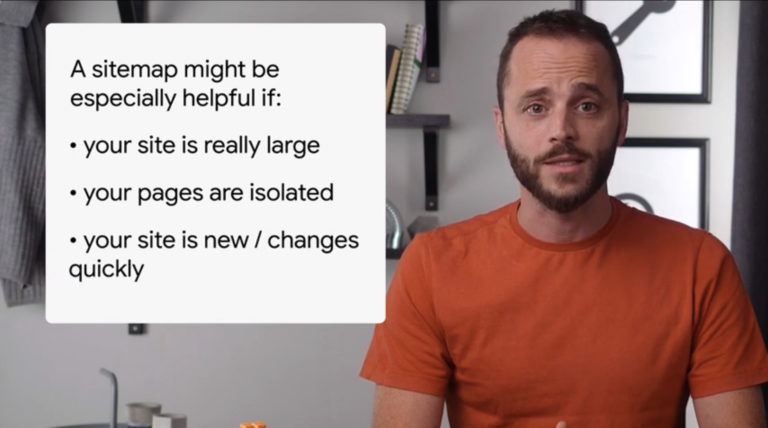Google’s Daniel Waisberg stated in a new video that sites don’t necessarily need sitemaps unless they fall into one of three categories.
This information was provided in the latest episode of Google’s Search Console Training series on YouTube. The video focuses on the basics of how to use the sitemaps report in Search Console.
To refresh on the latest features in the sitemaps report, see: Google Updates the Sitemaps Report in Search Console.
It’s probable that you’re already familiar with the sitemaps report in Search Console, and may even refer to it on a regular basis for sites you manage. So I’ll stick to covering some of the higher level items from the video.
 Google’s John Mueller makes a cameo in latest Search Console Training video
Google’s John Mueller makes a cameo in latest Search Console Training videoGoogle’s John Mueller made a cameo in the video to raise the question: “If I don’t have a sitemap will Google find all of my pages?”
Let’s start there.
Can Google Find Pages Without a Sitemap?
Usually, if the site is relatively small and its pages are all properly linked, then Googlebot can discover the content just fine.
“You don’t need to worry about a sitemap,” Waisberg says, before adding, “However, if your site meets one of the following criteria, a sitemap might help Google decide what and when to crawl your website.”
 Your site may benefit from a sitemap if it meets this criteria.
Your site may benefit from a sitemap if it meets this criteria.A sitemap might be especially helpful if:
- The site is really large
- The site’s pages are isolated
- The site is new or changes quickly
See: How to Update Sitemaps After You Change Your Content
In these instances a sitemap can assist with directing Googlebot toward new content and showing Googlebot where to find isolated pages. A sitemap can also be used to prioritize which content to crawl first, which is helpful for large sites.
A sitemap doesn’t guarantee anything, Waisberg adds, meaning Google will not always crawl every URL included in a sitemap.
Conversely, not including URLs in a sitemap doesn’t guarantee they won’t be crawled. Google is able to find pages whether or not they’re in a sitemap.
No Harm in Having a Sitemap
Although Google doesn’t outright recommend that all sites have a sitemap, Waisberg notes there’s no harm in having one.
So if you’re not sure whether or not your site needs one, you can always err on the side of caution and use one anyway.
“In most cases, your site will benefit from having a sitemap,” Waisberg says.
Google Recommends Automatically Generated Sitemaps
When it comes to creating sitemaps, Google specifically recommends using automatically generated sitemaps versus manually creating one.
Ideally, the system running your website will make sitemap files for you automatically. There are WordPress plugins and Drupal extensions out there for accomplishing this as well.
Lastly, be mindful of sitemap file sites. If your site is so large that it requires multiple sitemap files in order to contain all the URLs then that’s perfectly fine.
For more information about sitemaps, and the sitemaps report in Search Console, see the video below:





![AI Overviews: We Reverse-Engineered Them So You Don't Have To [+ What You Need To Do Next]](https://www.searchenginejournal.com/wp-content/uploads/2025/04/sidebar1x-455.png)